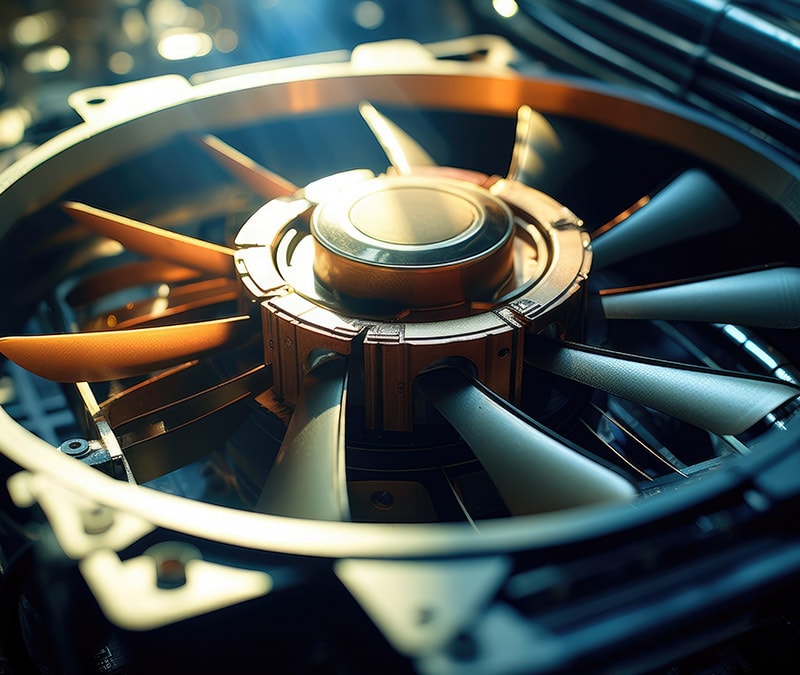How to speed up your computer (12 easy tricks)
Is your computer getting slower by the day? If so, try our tips to learn how to speed up your computer. Or, let Norton Utilities Ultimate help speed up and clean up your machine automatically so you can enjoy more space and faster performance.

If you notice that your once lightning-fast computer is struggling to keep pace with your needs, it’s time to figure out why. Chances are there’s a simple fix like restarting your computer or freeing up RAM that can help make your PC faster while saving you time, your sanity, and possibly money. Read on to learn how to speed up a slow computer.
1. Restart your computer
Restarting your computer can help speed it up by clearing out RAM and temporary files, freeing up system resources. As a bonus, a reboot can reset background processes and applications, possibly resolving underlying issues causing a system slowdown.
2. Close old tabs
Closing old tabs can help speed up your computer by freeing up memory and reducing the strain on your web browser. When you leave a tab open, it often runs processes in the background that can slow down your computer even when you aren’t using that tab. Keeping open tabs to a minimum can result in faster browsing speeds and smoother performance.
3. Turn off auto-launch
Turning off auto-launch for applications and programs can help speed up a computer by stopping unnecessary software from running in the background. Doing this conserves system resources and reduces the load on your CPU (central processing unit) and RAM.
Turn off auto-launch for your apps by going to Settings > Apps > Startup. Here, you’ll see a list of apps that can run automatically. To stop apps from auto-launching, toggle off next to each app you want to disable this feature on.
4. Delete unnecessary files and applications
One of the best ways to speed up a computer is by deleting unnecessary files and applications. Ultimately, this can result in quicker startups and program launches and smoother overall performance.
While it’s a good way to improve computer speed, deleting old files and applications manually can be a cumbersome process. Instead, use Norton Utilities Ultimate to automate the process by identifying and removing bloatware and needless applications running in the background. Norton Utilities Ultimate can also help fix common problems with your hard drive, software, and Windows operating system.
5. Install operating system updates
Operating system (OS) updates can help improve your computer’s speed by fixing bugs that slow performance. These software updates may also help improve the system’s efficiency, resulting in smoother operation. Additionally, the security patches that come with updates help keep your device safe from vulnerabilities that hackers can exploit.
Note that if you have an older device, it might not be able to handle the additional features of a new software update. If you're unsure, research the recommended requirements before updating.
If the updates don’t work, you can also consider reinstalling the operating system. That can sometimes help resolve software issues, remove clutter, and enhance overall performance.
6. Clean your computer
Physically cleaning your computer can help speed it up by improving airflow and preventing overheating. Regular computer maintenance should include removing dust from hardware components like fans and vents.
Clean your desktop computer by following these steps:
- Power off and unplug your computer.
- Dust the outside of your computer with a soft cloth.
- Remove the side panels (if possible).
- Use a can of compressed air or a soft cloth to remove dust from the fans, vents, and filters.
- Reinstall side panels or covers.
For laptops, check the manual for instructions on cleaning and if it’s safe to open the case. Most modern laptops don’t permit or need you to open the case, and doing so could void the warranty. You can usually just use a few short bursts of compressed air to clean the vents, as well as your keyboard and mouse.
Regularly cleaning your computer can help keep it cool and well-ventilated, which is an easy way to make your computer faster and help quiet the fan.
7. Scan for malware and viruses
Scanning for malware, adware, and viruses can help you identify and remove malicious software that consumes system resources. Malware can quietly run in the background, leeching off CPU and memory resources. Removing harmful software can free up those key resources, helping to improve system responsiveness and speed up your computer.
To cover all of your bases, use trusted antivirus software to regularly run security checks and help remove malware. This can help detect any issues that may be slowing your device and keep you and your personal information safer.
8. Use cloud storage or an external hard drive
Using cloud storage or an external hard drive can help speed up your computer by offloading storage-intensive software and files. Aside from improving overall system performance, external storage serves as a data backup solution, so you don’t lose anything important if your computer fails.
9. Defragment or upgrade your hard drive
Defragmenting your hard drive (HDD only) can help speed it up by consolidating files saved on the hard drive. When defragmenting a hard drive, you can rearrange those files into contiguous blocks, improving data access speed and system performance. If you want to start from scratch, you may also wipe your old hard drive clean.
Alternatively, upgrading your hard drive can help make your computer faster by enabling quicker read and write speeds, reducing access times, and increasing system responsiveness. Solid-state drives (SSDs) are much faster and can improve the speed of older devices. If you decide to make this upgrade, back up any important files to ensure nothing gets lost in the process.
10. Adjust performance settings
Another trick for boosting your computer’s speed is tweaking your computer’s performance settings. Depending on your device and aims, this may involve disabling animations, visual effects, and non-essential background services.
Additionally, updating your drivers can help ensure your hardware is running on the latest software and working efficiently to maximize speeds. You can do this manually or use a dedicated app like Norton Driver Updater to automatically scan for updates.
11. Pause syncing
Pausing the syncing features of some of your apps can help speed up your computer by reducing background network activity and reducing strain on your internal connection and system resources. By temporarily suspending automatic synchronization, you can reclaim your bandwidth and CPU resources. This is especially useful if you use cloud storage services like Dropbox or OneDrive, which eat up substantial system resources when they’re constantly syncing data.
12. Speed up your PC with Norton Utilities Ultimate
Say goodbye to laggy computers and teeth-grinding frustration. Norton Utilities Ultimate is a powerhouse tool that can help revitalize your PC, minimizing load times and increasing overall speed. With features that can help stop bulky programs from automatically running, identify unnecessary files to get rid of, remove system junk, and more, you can enjoy a faster, more reliable PC.
FAQs about speeding up your computer
Still have questions about how to speed up your computer? Here’s what you need to know.
What is a good speed for a computer?
A computer with a processing speed of 3.5 to 4 GHz is good, but users who game or run resource-intensive programs may require higher speeds. For RAM, 8 GB tends to be enough for most users.
How do I find the speed of my computer?
You can find the speed of your computer's processor and the amount of memory by checking its specifications in the system information area. To check this on a PC, go to Settings > System > About.
Why is my laptop so slow suddenly?
Laptops tend to slow down faster than desktops due to their design differences, largely impacted by size. But your laptop or desktop might suddenly become slow due to high CPU or memory usage stemming from background processes, malware infections, insufficient storage space, hardware issues like a failing hard drive, or overheating.
How can I figure out what’s slowing down my computer?
You can identify what's slowing down your computer by checking the Task Manager or Activity Monitor to see which processes are consuming the most CPU, memory, or disk usage. And use antivirus software like Norton AntiVirus Plus to scan for malware infections that may be hogging system resources and slowing you down.
What command can I use to speed up Windows 10 or 11?
One command you can use to potentially speed up Windows 10 or 11 is the chkdsk (Check Disk) utility, which checks for and repairs file system errors and bad sectors on the hard drive. It doesn’t directly speed up your PC, but it can free up space, allowing it to work faster.
Editorial note: Our articles provide educational information for you. Our offerings may not cover or protect against every type of crime, fraud, or threat we write about. Our goal is to increase awareness about Cyber Safety. Please review complete Terms during enrollment or setup. Remember that no one can prevent all identity theft or cybercrime, and that LifeLock does not monitor all transactions at all businesses. The Norton and LifeLock brands are part of Gen Digital Inc.
- 1. Restart your computer
- 2. Close old tabs
- 3. Turn off auto-launch
- 4. Delete unnecessary files and applications
- 5. Install operating system updates
- 6. Clean your computer
- 7. Scan for malware and viruses
- 8. Use cloud storage or an external hard drive
- 9. Defragment or upgrade your hard drive
- 10. Adjust performance settings
- 11. Pause syncing
- 12. Speed up your PC with Norton Utilities Ultimate
- FAQs about speeding up your computer






Want more?
Follow us for all the latest news, tips, and updates.